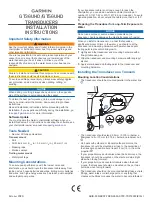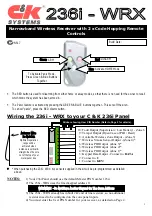
ATR833-II / P/N 833-II (Cxxx)-(Cxxx)
Operation and Installation
11
Doc.-No. 01.143.010.71e / Revision 1.01
2.4 Frequency Setting
Frequency setting is always done by the two steps of
1. Entering a new standby frequency to the desired value, and then
2. Interchanging the new standby frequency and the previous active
frequency by using the swap button
. .
Entering a new standby frequency can be done by
a) Manual input,
b) Recall of previously stored frequencies from the user memory
(memory locations 1-20), or
c) Recall from the list of the last 10 used frequencies.
2.4.1 Automatic Selection 8.33 / 25 kHz Channel Bandwidth
Whether a frequency is used with channel width 8.33 kHz or 25 kHz, is
automatically determined by the value of the frequency entered, and
requires no additional user activity.
The numbering scheme that is used for distinction of the two channel
widths is internationally standardized by the ICAO, and consistently used
in official documents (like e.g. VFR navigation charts) as well as in the
voice phraseology used by ATC radio communication.
Channels used with 25 kHz width are entered in multiples of 25kHz:
123.500, 123.525, 123.550, 123.575, 123.600 etc. These are compatible
with the old 25 kHz-only radios. To use the same frequencies with
8.33 kHz width, the frequency values entered are increased by 5kHz:
123.505, 123.530, 123.555, 123.580, 123.605 etc.
For more detailed information please refer to chapter 5.1 – but as said
above, for correct channel width selection this knowledge is not required.
2.4.2 Manual Frequency Input
The standby frequency is input by
•
Selecting with the
►
button which part of the frequency to change,
and
•
Changing the selected part with the FREQ rotary knob.













































